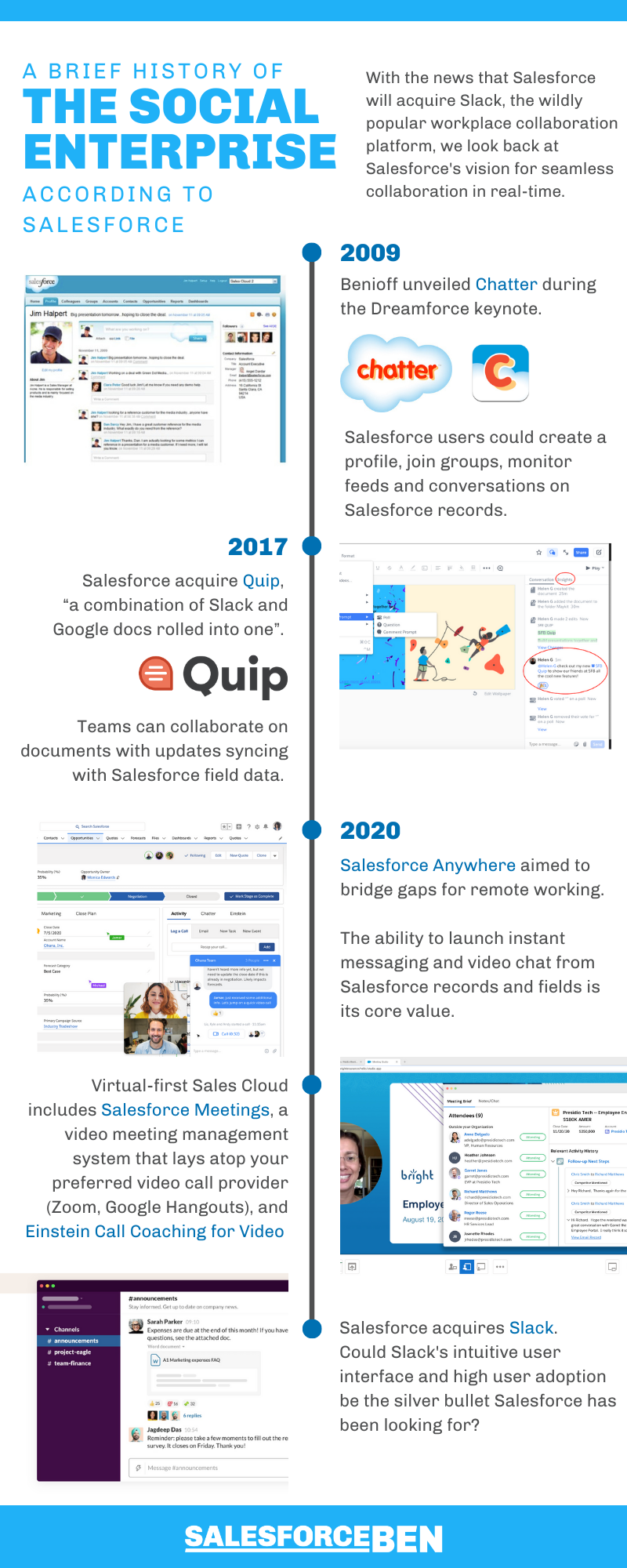Salesforce has announced that they will purchase Slack, the highly popular business communication platform that revolutionized virtual workspaces, for $27.7B.
With its intuitive user experience and high adoption, Slack brings hefty benefits to the table.
Why did Salesforce buy Slack?
Why is Slack such a great move for Salesforce?
1 – Deliver the social enterprise vision: Slack could be the silver bullet Salesforce has been looking to bolster their vision for the social enterprise. Acquisitions over the years have been iterations, but none that have truly clinched the deal for Salesforce.
2 – Meet new virtual sales/service demands: we’re now riding the remote working wave that has swept organizations globally. Salesforce is looking to further into the future and has developed multiple products this year to support businesses working in the new normal.
3 – Competitive play: Salesforce competitors have already embarked on the same ventures – Microsoft with Microsoft Teams, Adobe with Workfront. Not only is Salesforce looking to catch up, acquiring Slack could prevent any other competitors from doing the same.
What could a Salesforce + Slack future look like?
Source: Slack
Social Enterprise Vision – Chatter, Quip, Anywhere
The social enterprise vision goes as far back as 2009 when Benioff unveiled Salesforce Chatter.
Salesforce Chatter is a great technology. Chatter is fully baked into the Salesforce interface, has a decent set of functionality (polls, feeds, groups), and can be hooked into Salesforce’s automation capabilities, namely, Process Builder and Flow.
Where Chatter faces friction is in terms of roll-out effort; to implement Chatter properly, to reach a point where users will adopt Chatter into their work routines, a business ought to seek help from a specialized consultant. Slack paints a completely opposite picture: it’s seamless to pick up with zero friction in terms of user adoption.
Chatter remained largely unchanged for several years, and ‘collaboration’ died out as a buzzword. To prove this point, do you remember Chatty? I haven’t seen Chatty at conferences recently, have you?!


Source: Trailblazer Community
Along came Quip, acquired in 2017 – “a combination of Slack and Google docs rolled into one” ironically, was how Helen describes Quip in her overview article, “for simplicity it’s a Word Processing app, but a pretty cool one at that, especially the ways it can be used and how it integrates with your Salesforce org”.


Salesforce Anywhere, new for 2020, aimed to bridge collaboration gaps for teams working remotely. Anywhere’s main values were the ability to launch instant messaging and video chat from Salesforce records and fields. Salesforce Anywhere later combined with Quip capabilities.


Virtual-first Sales Cloud followed closely, which includes Salesforce Meetings, a video meeting management system that lays atop your preferred video call provider (Zoom, Google Hangouts), and Einstein Call Coaching for Video (part of Salesforce High Velocity Sales).
Even with these highlights, the sentiment is that there is still more that Salesforce needs in order to reach true, ‘sticky’ collaboration.
A Possible Salesforce + Slack Future
As both a Slack and Salesforce evangelist, I am looking forward to seeing how the marriage of the two takes shape. Here’s hoping that the intuitive Slack user interface will be combined with tighter integration with Salesforce records.
- Tighter integration with Salesforce records: the current Slack connector can fetch data from Salesforce records and make updates, but there’s room to tighten that whole user experience.


- Video call capabilities: Some observations are that Slack has somewhat fallen behind, losing its competitive edge due to a lack of video capabilities. Perhaps Slack will gain video capabilities, fulfilling what Salesforce Anywhere was aiming for?
- Instant messaging for desktop: Chatter for desktop was phased out. Could Salesforce make a similar move with Slack’s desktop app?
- Slack Connect opens up a host of new possibilities for companies to work with one another through shared channels.
- SMB market: Slack could give Salesforce a ‘leg-up’ in the SMB market. Slack is wildly popular in the SMB market (think start-up and hypergrowth companies). Although Salesforce has put Salesforce Essentials on to the market, it’s still a pricier offering. Slack would attract this portion of the market, which will grow their Salesforce install base as they scale.
Slack will be able to take advantage of Salesforce’s resources, both on the technical side and its global team of top-notch salespeople.
With their other collaboration offerings, whether Salesforce will replace or merge does remain to be seen. This speculation reminds me of the Tableau acquisition where similar questions were asked (Tableau vs. Einstein Analytics). We will have to sit back and watch the events unfold.
